Crispy onion pakoras ,kanda bhajiyas, kanda poha, onions rings are some of our favorite snacks especially in the season like monsoon. But are you aware of the tremendous health benefits of onion? Yes, neither avocado nor broccoli, onion can safely be tagged as the super food in India.
Onion is a staple ingredient in many household kitchens. We cannot imagine most of our Indian cuisine without onion. It gives a strong pungent flavor and forms an important base for many curries. It is the basic ingredients of the basic Indian salad along with cucumber and tomato. India is an onion loving nation that eats approximately 10 million tones of onion annually. Onion has its impressive health benefits which have been overlooked since long .Onion contain some super compounds which makes it a powerful healthy vegetable. Let’s take a dig at the health benefits of onion.

Health Benefits of Onions-
Onions have been cultivated since 5,000 years ago. Since the ancient time, it has been used to treat many health-related diseases. Onion is used for treating digestion problems including loss of appetite, upset stomach, and gallbladder disorders; for treating heart and blood vessel problems including chest pain (angina) and high blood pressure; and for preventing “hardening of the arteries” (atherosclerosis). It is also used for treating sore mouth and throat, whooping cough, bronchitis, asthma, dehydration, intestinal gas, parasitic worms, and diabetes. Some people use it as a diuretic to increase urine output. Onion is applied directly to the skin for insect bites, wounds, light burns, boils, warts, and bruises.
Onion contain Quercetin and Sulphur compounds as disease protective compound.
The health benefits of onions are attributed to their antioxidant flavonoid and sulfur containing compound.
Quercetin is antioxidants flavonoids present in onions which provide anti-diabetic, cancer-fighting, antibacterial and antihistamine properties.
The sulfur compounds present in onions are phytochemical. Allium and allyl disulfide, two phytochemical compounds in onions have been found to lower the risk of several types of cancer, assist in regulating blood sugar, reduce inflammation and heal infections. Allium and allyl disulfide, two phytochemicals in onions, are converted into allicin post-ingestion. Allicin, as per certain studies, has properties to fight cancer and diabetes. It can also reduce the stiffness of blood vessels and lower blood pressure levels. Even the other onion types like chives, leeks, and shallots have similar benefits.
1.Maintain a healthy heart
Quercetin with its potent anti-inflammatory properties helps to decrease risk factors of heart disease such as high blood pressure. A study in 70 obese people with high blood pressure found that a dose of 162 mg per day Quercetin rich onion extracts significantly reduced systolic BP by 3-6 mm Hg. Studies have shown that intake of quercetin rich onion has comparatively decreased bad cholesterol and high triglycerides level.
Sulfur compounds in onion act as a natural blood thinner and prevents platelets from clotting which may help low blood pressure and risk of heart attack or stroke.
Here are some of the things that onions can do for your heart:
- Boost beneficial HDL cholesterol
- Thin the blood
- Retard blood clotting
- Lower total blood cholesterol
- Lower triglycerides
- Lower blood pressure
- Reduces inflammation to the blood vessels (1, 2,3,4,5)
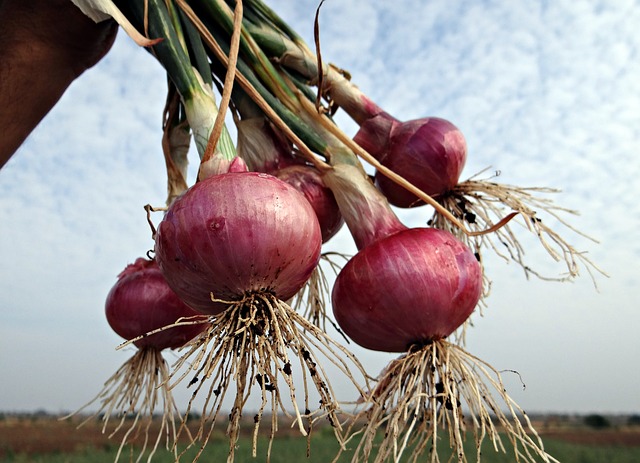
ALSO READ –
Why NO diet is the best diet for hypothyroidism
Feed your mind right -A dietary guideline for depression
2. Cancer-fighting properties
Researchers believe that up to 40% of cancer is preventable with a change in dietary habits alone.
Consuming onions frequently have shown to have a protective effect against certain cancer including stomach and colorectal tumors. Quercetin and sulfur compounds in onion inhibit tumor growth. Onions are the most effective in destroying breast and colon cancer cells. Onions activate the pathways that provoke the cancer cells to kill themselves. They make the environment unfavorable for cancer cells to communicate, and this inhibits their growth.
Studies show that participant with the highest onion intake at 15 percent reduces the risk of low rectal cancer compared to those with the lowest intake. (6,7,8, 9, 10)
3. Anti-diabetic properties
Eating onion may help control blood sugar levels. Quercetin and Sulphur compounds in onion have shown to interact with cells in the small intestine, pancreatic, skeletal muscle, fat tissue, and liver to control whole-body blood sugar level.Sulfur compounds in onions work to increase insulin production and thereby help in lowering high glucose levels. (11,12)
ALSO READ– Enough of diabetic diet – lets focus on reversing diabetes
4. Antihistamine properties
In lab studies, quercetin has shown to prevent histamine releases (are chemical that causes allergic reactions) this makes the onions natural antihistamines and reduce the production of allergic reactions. Patients with respiratory issues like asthma can benefit from certain fruits and vegetables, onion being one of them. Antihistamine properties of quercetin reduce nasal congestion and sulfur compounds can break down the mucus. (13)
5. Antibacterial properties
Recent studies found that quercetin extracted from onion protects against the growth of harmful bacteria E Coli and S aureus.It inhibits the growth of vibrio cholera bacteria that is responsible for life-threatening disease Cholera. (14, 15)
6. Boost bone density
Wondering how the onion is related, as we always associate dairy products with bone loss. Regular intake of all types of vegetables has shown to increase bone mineralization during childhood and maintenance of bone mass in young adults.
What is bone density?
Bone density is a measurement of the amount of calcium and other minerals found in your bones. Both osteoporosis and osteopenia are a condition characterized by low bone density.
Research has shown that onion consumption is associated with improved bone mineral density. It helps reduce oxidative stress, boost antioxidant level and decrease bone loss, which prevents osteoporosis and boost bone density. According to the Arthritis Foundation, quercetin in onions can inhibit the activity of leukotrienes, prostaglandins, and histamines (all of which cause inflammation) in osteoarthritis and rheumatoid arthritis. Onion intake was also found to help treat joint pains. A study in women over 50 years old found that those who consume onions most frequently had a 20% lower risk of osteoporosis as compared to women who rarely ate it. (16, 17, 18)
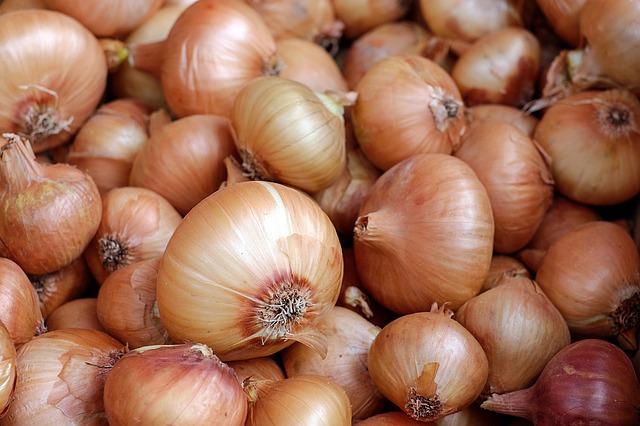
7. Onion contain prebiotic inulin to boost digestion
Onion contains prebiotic inulin and fructooligosaccharides which are dietary fibers to boost digestion. This prebiotics help by increasing the number of friendly bacteria in your gut and improves immunity, thus reduce inflammation and enhance digestion. (19 ,20, 21)
Also read – 4 steps for constipation treatment at home
8. Onions are good for oral health
Onions contain thiosulfinates and thiosulfonates (the sulfur compounds) that help reduce bacteria that cause tooth decay. And eating them raw is best – as cooking might destroy some of these beneficial compounds.
The onions are also rich in vitamin C that can keep the teeth healthy. Wash your mouth thoroughly after consuming onions as they cause bad breath.
The nutrient profile of onion
Onions are a good source of vitamins minerals and fiber.
Onions are rich in vitamin C, an essential nutrient involved in the repair of tissues and enzymatic production of a certain neurotransmitter. It also function as antioxidants, helps to improve iron absorption and boost immunity.
Onions are also a good source of B complex group of vitamins like pantothenic acid, pyridoxine, folate and thiamine which plays an important role in neurotic conditions. Vitamins B complex has a direct impact on our energy level, brain function, and cell metabolism.
Onions are a good source of potassium, an important mineral that functions as an electrolyte helps regulate fluid balance, nerve signal, and muscle contraction. Important for weight watchers onions are low in calories low in fat and sodium. Include onions in your diet in the form of salad, as a topping or mix with another vegetable to make curries. (22, 23, 24)
Nutritive value of onion (per 100 g of edible portion)
| Nutrients | Big Onion | Small Onion |
| Energy | 50 | 59 |
| Carbohydrate | 11.1 | 12.6 |
| Protein | 1.2 g | 1.8 g |
| Fat | 0.1 | 0.1 |
| Fiber | 0.6 | 0.6 |
| Minerals | 0.4 | 0.6 |
| Calcium | 46.9 | 40 |
| Iron | 0.6 | 1.2 |
| Vitamin C | 11 | 2 |
| Thiamin | 0.08 | 0.08 |
| Niacin | 0.4 | 0.5 |
Reference – Nutritive Value of Indian Foods,2016
Know About Onions
Onions are part of the allium family of vegetables and herbs, which also includes chives, garlic, scallions, and leeks. Allium vegetables have been cultivated for centuries for their characteristic, pungent flavors and their medicinal properties.
Onions can vary in size, shape, color, and flavor. The most common types are red, yellow, and white onions. Flavours can be sweet and juicy to sharp, spicy, and pungent, often depending on the season in which they are grown and consumed.
It is estimated that 105 billion pounds of onions are harvested each year, worldwide. India is the second-largest onion growing country in the world. Indian onions are famous for their pungency and are available round the year. Indian onions have two crop cycles, first harvesting starts in November to January and the second harvesting from January to May. (29, 30)
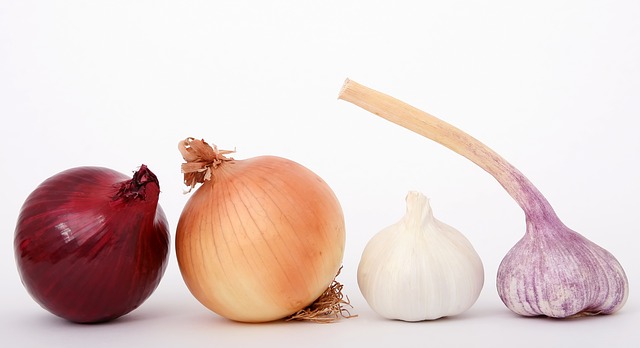
What are the different types of onions?
Onion is so widely used that any culinary dish from almost any part of the earth has the Onions added to it. The most commonly used ones are:
Yellow onions – They have ivory white flesh that is surrounded by heavy brown skin. They have a strong and sulfur-like aroma.
Sweet onions – They have a lighter, less-opaque skin that surrounds a larger and slightly fatter body of the vegetable.
White onions – They have a papery white skin, and they are milder and sweeter than their yellow counterparts.
Red onions – They are mild and sweet enough to be eaten raw. The exterior skin and flesh are a deep magenta.
Shallots – They are smaller and brown-skinned and have purple flesh.
Green onions – They are the immature onions that haven’t yet formed a bulb.
Leeks – They are shaped like overgrown scallions (the long-necked onion with a small bulb) and are usually used in sauces and soups.
Advantage of eating red onion
Onions are from the family genus allium, garlic and scallion (spring onions )also come in this category. Onions vary in size and color. The most commonly found in the Indian market are small-sized onions which are either golden brown or red. White and yellow color onions are also seen. Taste range from mild and sweet to sharp and pungent depending on the variety and season. Onions can be consumed when immature before it reaches full size these are scallions or spring onions mainly used in Chinese recipes and are very rich in vitamin A. White, yellow or red onions, all have the same nutrient content. However red onion has added advantage over other types because of the presence of anthocyanins flavonoids which are the plant pigment which gives red onions their deep red color. They are very rich in antioxidants and protects against heart disease, certain cancer, and diabetes. (25, 26, 27)
Should I eat onion raw or cooked?
Eating raw onions contain a whooping load of protective compounds. Don’t worry if you dislike eating raw onion, you can still have the protective benefits of it. Cooked onions also weigh on the protective side. Consider cooking onion at low heat and avoid high temperature to limit the loss of nutrients and antioxidant.
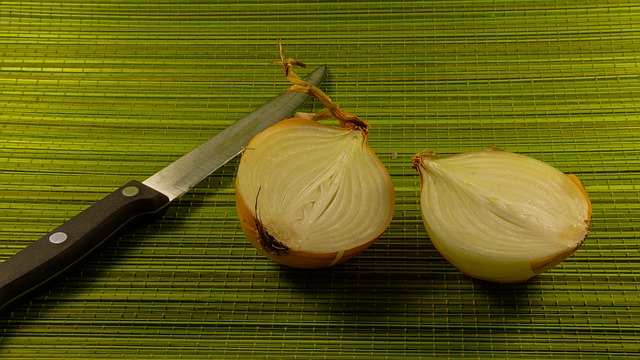
Why do I cry when I cut onions?
Slicing onions make you cry because when you cut the onion, it produces sulfur base gas which is highly volatile and react with water in your eyes and form sulphuric acid. This sulphuric acid irritates the eyes. To get rid of this irritant, the tear duct release more tears in eye and tears starts rolling down. slicing 2-3 onions is okay but if u have more onions to dice then this quick tip will help you in no more tears. When cutting onions try moving your face away from the onion so the gas disperses in the air before reaching your eyes. Chill the peeled onion few minutes in the fridge before cutting.
Do not over peel the onions
It has been found that the outer layers of onion contain a high level of antioxidant flavonoids which are the protective compound in onion. According to Recent studies, peeling the first two layers of onion removes 75 percent of flavonoid anthocyanin and 20 percent of quercetin. So be careful, when peeling the onions or u will lose the protective compounds.
Does eating onion cause problem
Risk of onion consumption is very rare. However, some people are intolerant to onion intake and develop symptoms of gastric discomfort and skin allergies. All healthy fruits and vegetables may hurt the body, if over consumed. So the healthy way of eating is to incorporate all variety of fruits and vegetables in our day to day diet rather than concentrating on one individual food. Onions are the staple food in the kitchen and can be easily incorporated with wide varieties of dishes to add flavor. They can be chopped used fresh as a topping for sandwiches, or in salads and added to dips, soup, chutneys or raitas. (28)
Onion herbal supplements
The extract from onion is also used to make supplements. It is available in the form of a pill, capsule or topical cream. Always take care while taking supplements and consult your dietitian or healthcare provider.
Also read –
Is it necessary to take dietary supplements
Hot is healthy – 12 health benefits of black pepper
Cinnamon: the super spice in your kitchen
Time to take turmeric benefits seriously
9 health benefits of cardamom- the queen spice
Summary
The humble onion with its pungent flavor is no doubt the healthiest vegetable you can ever have in your diet. This staple vegetable has been neglected for its nutritional benefits to the so-called super foods like beetroot, broccoli. The health benefits of onion come from its powerful phytochemicals which contain many protective compounds that help us against many health-related diseases. Many studies have suggested that increasing the consumption of plant food like an onion that is anti-bacterial, antioxidant, promotes better digestive health and thereby improving the overall immune system and keeping us fit and healthy. Incorporating this vegetable in your diet is the easiest and the simplest way to benefit overall health.Just enjoy your roti sabji with fresh sliced crunchy onion with a dash of lemon juice.
About the author –
Vandana Kondepudi has done her postgraduation in Dietetics and Nutrition from SNDT Women University Mumbai. She has presented the thesis on dietary diagnosis in cardiovascular diseases and cancer. She worked as a nutritionist in a survey conducted by government organisation of Mumbai . She also worked as a ditetitian at Talwalkars Mumbai.

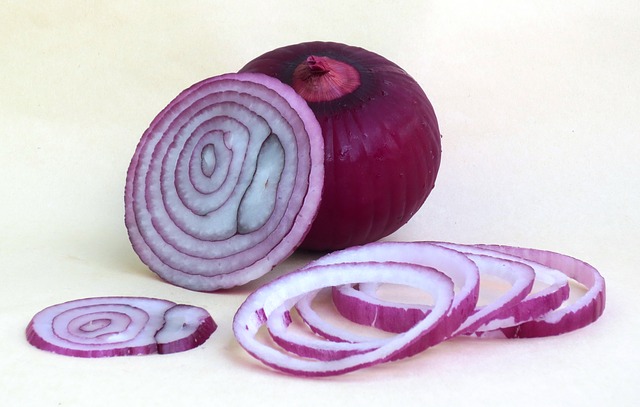
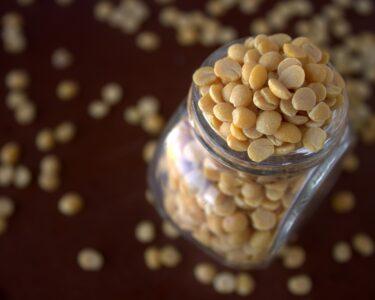



2 Comments